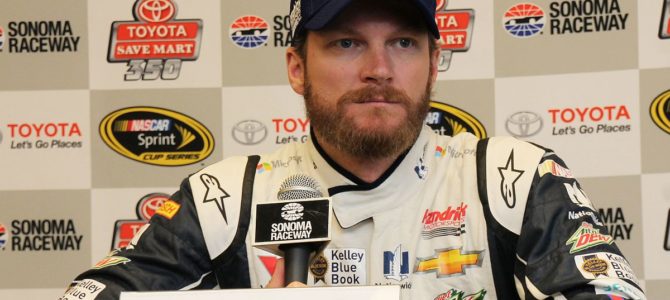
Few things epitomize the ephemeral nature of twenty-first-century culture—online hordes flitting about from trend to trend, barely stopping to ponder the meaning of them—than the meme. But on rare occasions, those memes hint at larger truths.
In a race at Chicagoland Speedway on July 1, former stock car racer-turned-commentator Dale Earnhardt Jr. stumbled his way into memedom. As Kyle Busch and Kyle Larson battled their way through a thrilling last-lap shootout, Earnhardt exclaimed “Slide job!” in a manner that became an instant viral sensation. For the uninitiated, a “slide job” occurs when one car dives into the corner fast and low, and makes a pass by sliding up in front of another car—hence the name.
That call—in Earnhardt’s first race in the broadcast booth—sparked myriad Twitter commentary and mimicking videos. Broadcast partner NBC noted that “if only we COULD sell this as a T-shirt,” which of course prompted an online vendor to run with the idea and sell Dale Earnhardt Jr. “Slide job!” T-shirts (and hoodies).
Beyond the jokes surrounding that impromptu exclamation laid the underlying reason for the exclamation itself: Earnhardt really loves racing. That much became obvious after his second race in the broadcast booth, Saturday evening’s race from the Daytona International Speedway. I’ve heard Earnhardt Jr. speak in countless pre-race and post-race interviews. But in listening to his first two broadcasts, his voice sounded distinctly different—occasionally louder, with a faster cadence than his usual Southern drawl.
By the end of Saturday night’s race at Daytona, it finally hit me: He loves watching these races as a fan. And he just might have re-discovered his love of racing by stepping out of a race car.
Two thoughts:
1). @DaleJr did amazing in the booth. The energy, excitement and fandom will help connect new fans to the sport. Jr. is possibly the biggest and greatest ambassador of the sport all-time.2). We need a #slidejob shirt ASAP. #Chicagoland #NASCARonNBCSN
— Josh Englund (@JPEnglund) July 2, 2018
Particularly for Earnhardt, that he could derive such intense joy from stock car racing seemed like a revelation. While the younger Earnhardt’s driving career contained weighty accomplishments, it also came with equally weighty burdens.
As the son and namesake of a seven-time Cup series champion, Earnhardt always faced tremendous pressure at the track. His father’s untimely death on the last lap of the 2001 Daytona 500 only added to the emotional toll. The elder Earnhardt’s death increased the son’s profile at a time Dale Junior, at 26 just starting his second full-time season in NASCAR’s premier series, still sought to establish himself as a driver.
The fans flocked to him, just as they had flocked to his father. Fifteen straight years of winning NASCAR’s Most Popular Driver award proved that. The entire series celebrated when Earnhardt Junior won the summer race at Daytona in July 2001, claiming victory in the very next race at the track that had so tragically claimed his father’s life five months before.
But Dale Junior also struggled with the weight of expectations. At the end of the 2007 season, he left Dale Earnhardt Incorporated—the team his late father founded, and which his stepmother still ran—in hopes that a move to Hendrick Motorsports would help him achieve a championship. He admitted that the move created hard feelings with his stepmother, calling it “too personal” and “upsetting as h-ll and unfortunate.”
The championships that came easily for Earnhardt Senior never arrived for his son, in part because stock car racing entered a more competitive era. Dale Junior’s feats as a driver—26 wins, including two victories in the Daytona 500, the “Super Bowl of Stock Car Racing”—rival some of the greatest names in the sport. But his father’s legacy, and the series of concussion-related symptoms that prompted Dale Junior to skip the second half of the 2016 season and retire completely after the 2017 campaign, seemed, if not to overshadow his impressive driving career, to lurk in the background for much of it.
As the Internet soon found out after the Chicago race, junior’s move to the broadcasting booth gave him an opportunity to see the sport that helped to define him, and his family, with new eyes and from a fresh perspective. From his other comments in the “slide job” call—from “This is crazy!” to “Oh, my goodness!”—to his commentary during the broadcast at Daytona this weekend—“Look at this! Watch his hands in the car!”—Earnhardt has made crystal-clear his enthusiasm for racing, and his love for the driver’s craft.
For decades in sports, former athletes have transitioned from the playing field to the broadcast booth. But based on an admittedly small sample size, Earnhardt Junior’s sense of admiration and excitement at watching his former colleagues’ racing feats shines through in a way that few other commentators can match.
Ironically, one of the other famous announcing calls in stock-car racing history came at the expense of Earnhardt Senior. A quarter-century ago, at the end of the 1993 Daytona 500, CBS announcer (and former Cup series champion) Ned Jarrett called his son home to victory, as Dale Jarrett beat Dale Earnhardt Senior in the “Dale and Dale show:”
According to Earnhardt Junior, Jarrett apologized to Dale Senior the week afterwards for cheering his son on. As a father himself, Dale Senior said he didn’t mind.
In his first two races in the broadcasting booth, Earnhardt Junior showed all the enthusiasm that Jarrett did, but without rooting for any one driver in particular so much as the sport as a whole. If he continues in this role, Earnhardt may help to attract more fans back to a sport that had been on the wane in recent years.
Just as important, by stepping out of the high-pressure driver’s cockpit, Earnhardt appears to have rediscovered the reasons he started racing in the first place—an outcome all Dale Junior fans can celebrate.









